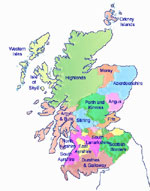|
|
Welcome to Brora Scotland
 Brora
lies on the east coast of Sutherland, in prime golfing country. Brora
lies on the east coast of Sutherland, in prime golfing country.
Brora has two claims to Scottish uniqueness: it once possessed the only
bridge in the region - which gave it its name, meaning River of the Bridge
- and until the 1960s, had the only coal mine in the Highlands. Nowadays
this small town between Dornoch and Wick is a good base for a number of
superb golf courses in the area, and for touring Caithness and Sutherland.
Three miles south of Brora is a preserved Iron Age broch, Carn Liath.
You can walk there by the coastal path between Brora and Golspie, six
miles away. Seals can be seen along the walk, and even otters if you are
lucky.
A further attraction is the Clynelish Distillery a mile north of Brora,
where you can get a guided tour and, of course, a wee dram.
Accommodation in and Brora
Price Guide - per person based on sharing room:  under $40 -
under $40 -  $41
- 70 - $41
- 70 -  more than
$70 more than
$70
 Hotels and Guesthouses below -
Hotels and Guesthouses below -  Self catering cottages click here
Self catering cottages click here
The best place from which to appreciate Brora as a resort is from near
the Golf Club, overlooking the mouth of the River Brora from the north.
North of here an attractive stretch of beach is backed by the golf course:
whose north end is in turn bounded by Brora's main caravan site, run by
the Caravan Club.
On the south side of the river is Brora's attractive small harbour. From
here the coast curves around a slight headland on which you find two rows
of white-painted cottages, once used by the fishermen who used the harbour,
or the men working the salt pans that were long a feature of the area.
South again are dunes and more beach, while the main village of Brora
lies a little inland and raised above the shoreline.
For much of its history Brora was the industrial powerhouse of Sutherland.
Coal was mined here as early as the 1500s. The pit, initially south of
the River Brora and a little inland from the centre of the town, closed
in 1810 and relocated to the north side of the river. Here it used water
powered pumps to allow mining to take place at depths of 100m or more.
After an unusually long history, Brora's pit finally closed as recently
as 1974.
As a harbour, Brora's history also dates back five hundred years or more.
It was never really large enough to compete with other fishing ports on
this coast that grew to take advantage of the herring boom in the early
1800s. But the harbour was and still is home to a small fishing fleet.
The harbour did become important during the herring boom for the export
of salt. Coal from the pit was burned under pans of sea water along the
coast here, evaporating off the water and leaving the salt. At the height
of the demand, in 1818, 400 tons of salt were produced annually in Brora,
meeting most of the needs of the herring fleets along this coast. The
harbour also helped export coal produced by the pit until displaced by
the railway on its arrival in Brora in the 1870s.
Brora also has a history of textile manufacture, with Hunter's of Brora
maintaining a long tradition in the town until it went out of business
in 2003. Whisky production, which started in 1919 is alive and well however.
Clynelish Distillery can be found a little west the A9 as it heads north
out of the town. The old distillery it replaced became known as Brora
Distillery, and still stands nearby although it was closed in 1983.
The centre of Brora is largely built of grey stone that in poor weather
can make it seem rather, well, grey. But if you bother to explore a little,
you find a village with as much charm as it has history. |
![]() Email enquiries & reservations: bookscotland@madbookings.com
Email enquiries & reservations: bookscotland@madbookings.com
 Brora
lies on the east coast of Sutherland, in prime golfing country.
Brora
lies on the east coast of Sutherland, in prime golfing country.




